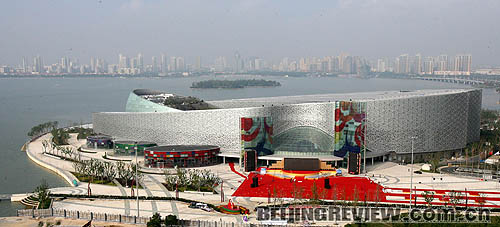|

SOLID GROUND: Solid infrastructure foundations pave the way for Suzhou Industrial Park to become an outsourcing hotbed
QI ZHENLIN
Chinese-American Patrick Lu, Executive Vice President of Asia Operations of Dextrys Co. Ltd., probably had never thought of settling down in Suzhou, thousands of miles away from his home in the United States when he came here three years ago.
To start up the business of U.S.-based Dextrys in China, Lu resolutely left Silicon Valley where he had worked for over 10 years. Now he seems determined to further "become Chinese"亅he bought a new house here for his family members who recently moved here to be with him. "That's because I have a career here, and I enjoy my life in Suzhou," Lu told Beijing Review in broken Chinese mixed with English words.
Suzhou in east China's Jiangsu Province is worth staying in for Lu. Dextrys, formerly DarwinSuzsoft, has grown to a leading provider of software outsourcing services of the city, boasting over 2,000 employees. Three years ago it had only three employees in China.
In 2005, Dextrys outbid hundreds of international rivals to land a BPO (business process outsourcing) contract with the U.S. Boeing Co., netting over $500,000 in revenue. But as a matter of fact, its intangible assets had far surpassed that number. Coming on the heels of Boeing, P&G, Nokia, Microsoft, GE, IBM, Citibank and Motorola all opted for Dextrys as their outsourcing service provider.
According to Lu, the total revenue of Dextrys will surpass $20 million this year亅an explosive growth over the previous year.
Sniffing out opportunity
Currently, around 120 of the world's top 500 corporations have flocked to Suzhou and most of them farm out almost 70 percent of their business processes to cut costs by centralizing operations. In recent years, Suzhou has established itself as a major manufacturing base on the back of heavy foreign investments and the manufacturing boom of the country.
Data indicate that the Suzhou Industrial Park raked in over 5 billion yuan ($714.3 million) from service outsourcing in 2007, clocking a sharp growth of 67 percent over the previous year.
"Favorable policies in tax rates, market access, land use, and labor supply and sound environmental protection also added fuel to the industry," added Lu.
In total, local environmental protection departments have blocked attempts of over 300 polluting projects worth $2 billion to enter the industrial park. Nevertheless, it has introduced contracted foreign investment of $31.6 billion, including 115 projects of the world top 500 enterprises.
Playing catch-up
Dextrys is one of the only service outsourcing providers of the industrial park positioned toward the European and American market. Others mostly focus on the domestic market or Japan and South Korea. The largest service outsourcer Neusoft derives 90 percent of its contracts from Japan, only 10 percent from Europe and the United States. But even Japan can only contribute 5-10 percent to the world outsourcing market, underlying severe deficiency of Chinese outsourcers.
As competition burns hot at home and growth of domestic profits slackens, they have started to look abroad, particularly at the U.S. outsourcing business, for new growth. Buoyant demand from the United States has sharply pushed up China's software export revenue.
In recent years, China and India have been battling it out for major slices of the increasingly lucrative outsourcing pie. Traditionally deemed as a hub of services and information technology projects, India pulled far ahead of China, which is partly handicapped by a shortage of English-speaking engineers. Currently, India has snapped up 65 percent of the global software outsourcing shares and 46 percent of the global service outsourcing market.
However, as China leverages its superior infrastructure and cheaper labor, and expands its pool of highly qualified, English-speaking personnel, the dynamics are set to change.
In recent years, wage inflation has eaten into Indian companies' margins, and concerns of multinationals are brewing that they had put their eggs in one basket. Enjoying growing foreign investment, political stability and strong government support for the outsourcing industry, Chinese outsourcers are blessed with opportunities to narrow the gap.
IDC, a world-famous market leader, projected a staggering 44.3-percent growth rate of China's software outsourcing for the next five years, eclipsing the 9-percent world average. China's outsourcing revenue is set to surpass $18 billion by 2010 and $56 billion by 2015.
Analysts claimed that in a few years, about 5-10 percent of the U.S. and European software outsourcing will be diverted from India to China. Increased outsourcing contracts will boost mergers and acquisitions within China's software industry, so that enterprises can scale up and win more contracts, according to the analysts.
"Shortcomings in size have impaired Chinese outsourcers' capabilities for big orders, which entail long-time cooperation of large-scale teams," said Lu. "As a result, Dextrys is scrambling to cure the dwarf problem. Lucrative salaries are offered to recruit around 400 professionals annually from all over the globe, mostly engineers."
"Compared with their Indian peers, Chinese outsourcers are adept at availing themselves of new technologies," he added. "Meanwhile, a growing number of Indian outsourcing providers are hedging their bets by directly investing in China, which would push forward mutual development. Dextrys is aiming to list in New York, which would further help with market infiltration in the United States." | 